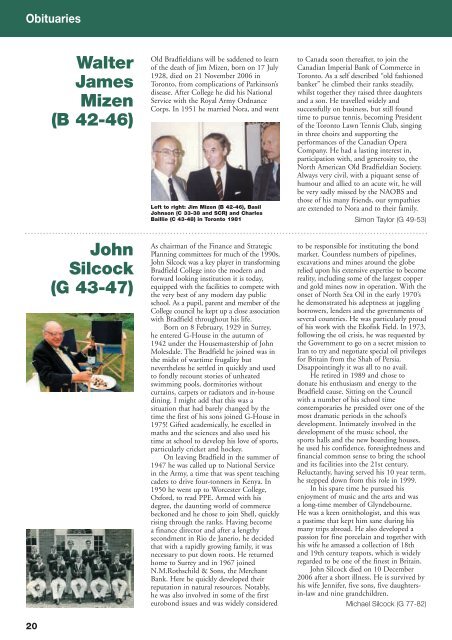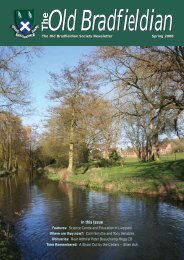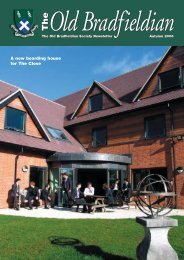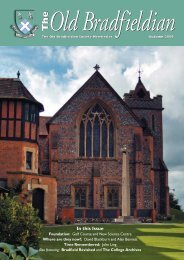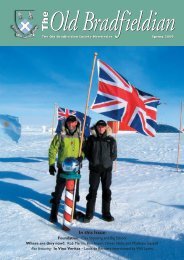OB News Autumn 2007 - the Bradfield Community
OB News Autumn 2007 - the Bradfield Community
OB News Autumn 2007 - the Bradfield Community
You also want an ePaper? Increase the reach of your titles
YUMPU automatically turns print PDFs into web optimized ePapers that Google loves.
Obituaries<br />
20<br />
Walter<br />
James<br />
Mizen<br />
(B 42-46)<br />
John<br />
Silcock<br />
(G 43-47)<br />
Old <strong>Bradfield</strong>ians will be saddened to learn<br />
of <strong>the</strong> death of Jim Mizen, born on 17 July<br />
1928, died on 21 November 2006 in<br />
Toronto, from complications of Parkinson’s<br />
disease. After College he did his National<br />
Service with <strong>the</strong> Royal Army Ordnance<br />
Corps. In 1951 he married Nora, and went<br />
Left to right: Jim Mizen (B 42-46), Basil<br />
Johnson (C 33-38 and SCR) and Charles<br />
Baillie (C 43-48) in Toronto 1981<br />
As chairman of <strong>the</strong> Finance and Strategic<br />
Planning committees for much of <strong>the</strong> 1990s,<br />
John Silcock was a key player in transforming<br />
<strong>Bradfield</strong> College into <strong>the</strong> modern and<br />
forward looking institution it is today,<br />
equipped with <strong>the</strong> facilities to compete with<br />
<strong>the</strong> very best of any modern day public<br />
school. As a pupil, parent and member of <strong>the</strong><br />
College council he kept up a close association<br />
with <strong>Bradfield</strong> throughout his life.<br />
Born on 8 February, 1929 in Surrey,<br />
he entered G-House in <strong>the</strong> autumn of<br />
1942 under <strong>the</strong> Housemastership of John<br />
Molesdale. The <strong>Bradfield</strong> he joined was in<br />
<strong>the</strong> midst of wartime frugality but<br />
never<strong>the</strong>less he settled in quickly and used<br />
to fondly recount stories of unheated<br />
swimming pools, dormitories without<br />
curtains, carpets or radiators and in-house<br />
dining. I might add that this was a<br />
situation that had barely changed by <strong>the</strong><br />
time <strong>the</strong> first of his sons joined G-House in<br />
1975! Gifted academically, he excelled in<br />
maths and <strong>the</strong> sciences and also used his<br />
time at school to develop his love of sports,<br />
particularly cricket and hockey.<br />
On leaving <strong>Bradfield</strong> in <strong>the</strong> summer of<br />
1947 he was called up to National Service<br />
in <strong>the</strong> Army, a time that was spent teaching<br />
cadets to drive four-tonners in Kenya. In<br />
1950 he went up to Worcester College,<br />
Oxford, to read PPE. Armed with his<br />
degree, <strong>the</strong> daunting world of commerce<br />
beckoned and he chose to join Shell, quickly<br />
rising through <strong>the</strong> ranks. Having become<br />
a finance director and after a lengthy<br />
secondment in Rio de Janerio, he decided<br />
that with a rapidly growing family, it was<br />
necessary to put down roots. He returned<br />
home to Surrey and in 1967 joined<br />
N.M.Rothschild & Sons, <strong>the</strong> Merchant<br />
Bank. Here he quickly developed <strong>the</strong>ir<br />
reputation in natural resources. Notably,<br />
he was also involved in some of <strong>the</strong> first<br />
eurobond issues and was widely considered<br />
to Canada soon <strong>the</strong>reafter, to join <strong>the</strong><br />
Canadian Imperial Bank of Commerce in<br />
Toronto. As a self described “old fashioned<br />
banker” he climbed <strong>the</strong>ir ranks steadily,<br />
whilst toge<strong>the</strong>r <strong>the</strong>y raised three daughters<br />
and a son. He travelled widely and<br />
successfully on business, but still found<br />
time to pursue tennis, becoming President<br />
of <strong>the</strong> Toronto Lawn Tennis Club, singing<br />
in three choirs and supporting <strong>the</strong><br />
performances of <strong>the</strong> Canadian Opera<br />
Company. He had a lasting interest in,<br />
participation with, and generosity to, <strong>the</strong><br />
North American Old <strong>Bradfield</strong>ian Society.<br />
Always very civil, with a piquant sense of<br />
humour and allied to an acute wit, he will<br />
be very sadly missed by <strong>the</strong> NA<strong>OB</strong>S and<br />
those of his many friends, our sympathies<br />
are extended to Nora and to <strong>the</strong>ir family.<br />
Simon Taylor (G 49-53)<br />
to be responsible for instituting <strong>the</strong> bond<br />
market. Countless numbers of pipelines,<br />
excavations and mines around <strong>the</strong> globe<br />
relied upon his extensive expertise to become<br />
reality, including some of <strong>the</strong> largest copper<br />
and gold mines now in operation. With <strong>the</strong><br />
onset of North Sea Oil in <strong>the</strong> early 1970’s<br />
he demonstrated his adeptness at juggling<br />
borrowers, lenders and <strong>the</strong> governments of<br />
several countries. He was particularly proud<br />
of his work with <strong>the</strong> Ekofisk Field. In 1973,<br />
following <strong>the</strong> oil crisis, he was requested by<br />
<strong>the</strong> Government to go on a secret mission to<br />
Iran to try and negotiate special oil privileges<br />
for Britain from <strong>the</strong> Shah of Persia.<br />
Disappointingly it was all to no avail.<br />
He retired in 1989 and chose to<br />
donate his enthusiasm and energy to <strong>the</strong><br />
<strong>Bradfield</strong> cause. Sitting on <strong>the</strong> Council<br />
with a number of his school time<br />
contemporaries he presided over one of <strong>the</strong><br />
most dramatic periods in <strong>the</strong> school’s<br />
development. Intimately involved in <strong>the</strong><br />
development of <strong>the</strong> music school, <strong>the</strong><br />
sports halls and <strong>the</strong> new boarding houses,<br />
he used his confidence, foresightedness and<br />
financial common sense to bring <strong>the</strong> school<br />
and its facilities into <strong>the</strong> 21st century.<br />
Reluctantly, having served his 10 year term,<br />
he stepped down from this role in 1999.<br />
In his spare time he pursued his<br />
enjoyment of music and <strong>the</strong> arts and was<br />
a long-time member of Glyndebourne.<br />
He was a keen ornithologist, and this was<br />
a pastime that kept him sane during his<br />
many trips abroad. He also developed a<br />
passion for fine porcelain and toge<strong>the</strong>r with<br />
his wife he amassed a collection of 18th<br />
and 19th century teapots, which is widely<br />
regarded to be one of <strong>the</strong> finest in Britain.<br />
John Silcock died on 10 December<br />
2006 after a short illness. He is survived by<br />
his wife Jennifer, five sons, five daughtersin-law<br />
and nine grandchildren.<br />
Michael Silcock (G 77-82)


